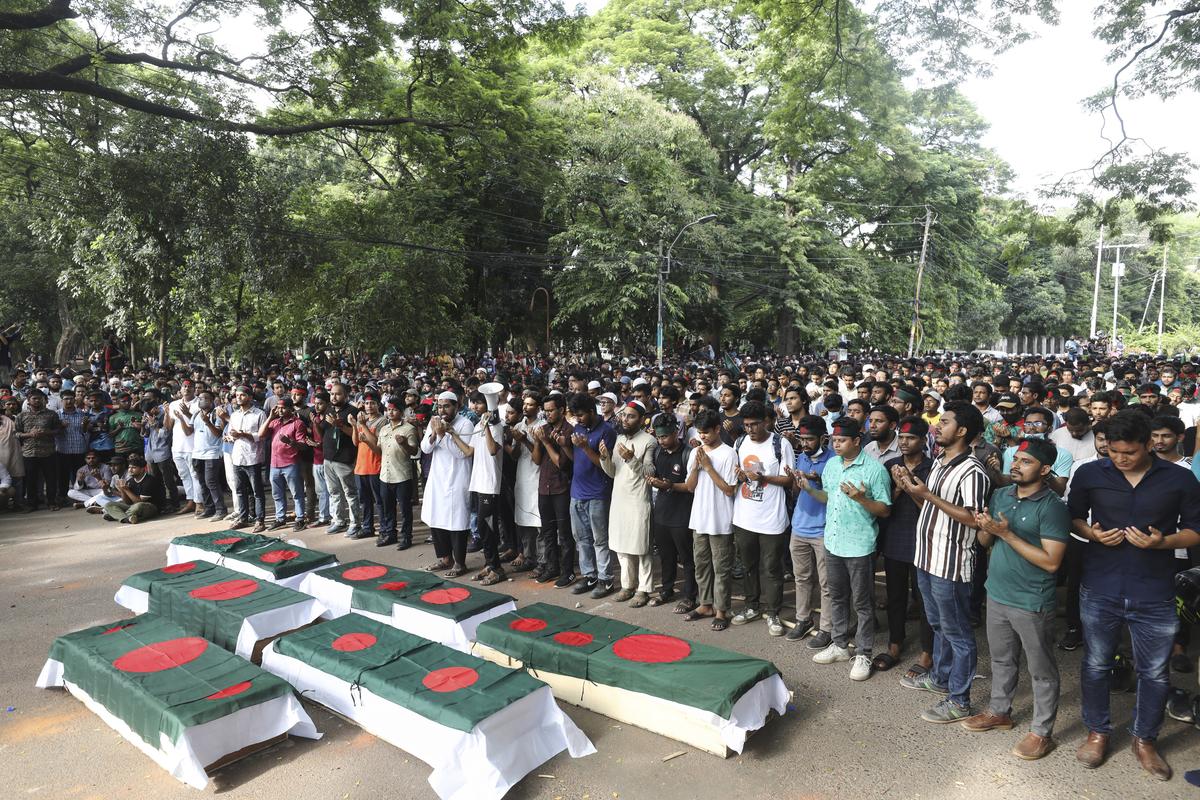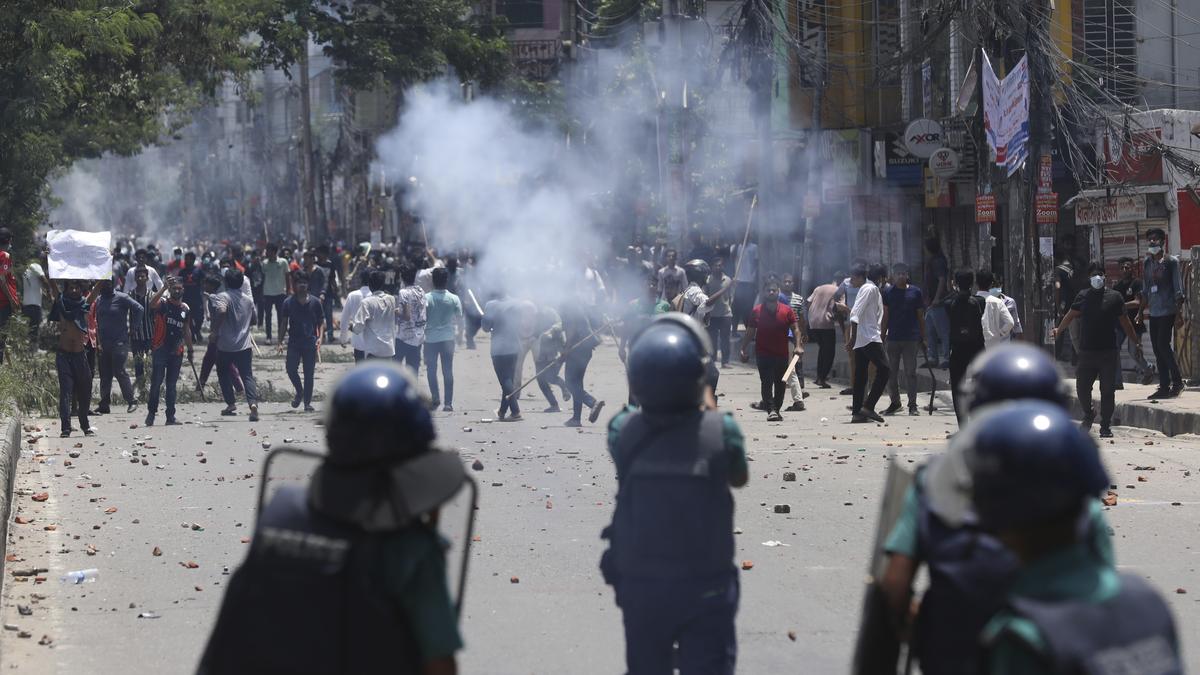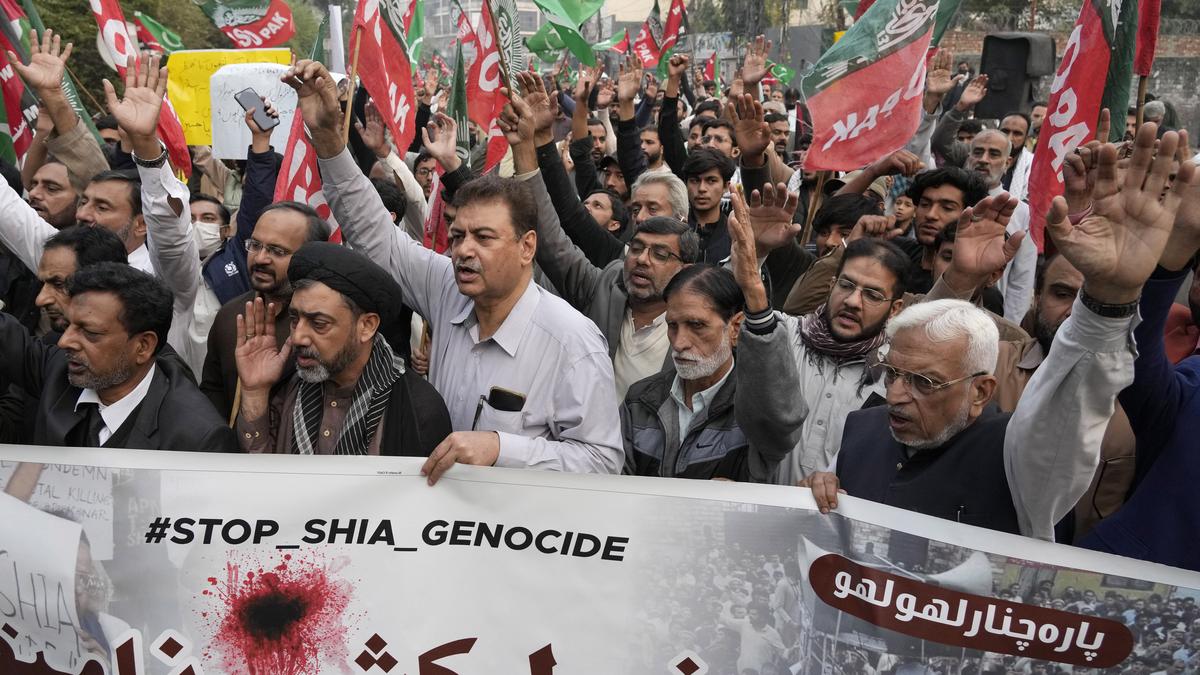Police in Bangladesh clashed with student protesters attempting to impose a “complete shutdown” of the country on Thursday, following days of violent confrontations during demonstrations over a system of allocating government jobs, with media reports saying 19 more people died across the country.
Dhaka-based leading Prothom Alo newspaper, which has a strong network of reporters across the country, said that by late Thursday night, they received reports of 19 deaths in Dhaka and elsewhere in the raging violence. The country’s leading English-language Daily Star also reported 19 deaths.
Thousands of students armed with sticks and rocks clashed with armed police in Dhaka, as authorities in Bangladesh cut some mobile internet services to quell anti-job quota protests that have killed more than a dozen people and left hundreds injured https://t.co/zMieo39UuDpic.twitter.com/ltVkbKfPig
— Reuters (@Reuters) July 19, 2024
With the latest toll, the number of deaths has reached 25, since Tuesday when six others lost their lives in the violence.
The dailies said hundreds more were injured on Thursday.
Authorities didn’t confirm the figures immediately.
Prothom Alo said at least six people died in Dhaka’s Uttara area alone in the latest clashes between the protesters and the security officials and ruling party activists. Thirteen others including a Dhaka-based journalist of an online portal died in other parts of the capital and elsewhere.
Also read | India urges citizens in Bangladesh to stay indoors in advisory as deadly protests escalate
The country’s state-run Bangladesh Television station’s head office was attacked as the protesters broke the main gate, and set the reception and vehicle on fire, a news producer and a reporter told The Associated Press by phone on condition of anonymity as they were afraid of attack.
“I escaped by leaping over the wall but some of my colleagues got stuck inside. The attackers entered the building and set furniture on fire,” the producer said by phone. He said the television continued broadcasting but some residents in Dhaka said they found no signal at home for the station.
Students have been demonstrating for weeks against a quota system for government jobs they say favors allies of the ruling party, but the protests have escalated since violence broke out between protesters, police and pro-government student activists on the campus of Dhaka University on Monday. Six people were killed on Tuesday, leading the government to ask universities across the country to close and police to raid the main opposition party’s headquarters.

As violence continued to take place Thursday, Bangladesh’s Law Minister Anisul Huq said in the afternoon that Prime Minister Sheikh Hasina asked him to sit down with the protesters for a dialogue, and he was ready to speak with them on Thursday if protesters were willing.
On Wednesday night, the protesters announced they would enforce “a complete shutdown” allowing only emergency services across the country on Thursday in response to security officials’ continued attacks on the campus demonstrators. The opposition Bangladesh Nationalist Party said that it would do what it could to make the shutdown a success.
Clashes continued as protesters attempted to enforce the shutdown Thursday morning. In Dhaka’s Uttara neighborhood, hundreds of protesters were chased by police after they blocked the road and chanted. In other places, police fired tear gas and charged with batons to disperse the protesters, who threw stones in response. Scores, including police, were injured in the violence, said a spokesperson for the Dhaka Metropolitan Police.
Police said protesters attacked and set fire to a traffic police box and vandalized police vehicles amid clashes across the city.
Traffic was thin on Dhaka’s usually clogged streets on Thursday morning, while many malls closed. Offices and banks opened, but commuters complained that transport was limited. Police set up checkpoints at the entrances to Dhaka University.

Students advocating for quota reform in public service held a mock funeral at Dhaka University in memory of those who died during clashes, in Dhaka, Bangladesh, on July 17, 2024. | Photo Credit: AP
Local television reported violence in other cities including Chattogram and Khulna, while protesters also blocked some major highways.
Salma Rahman, an official at a financial institution in Dhaka, said that she left her car at home and caught a ride on a motorcycle. “Our office has alerted us to stay safe on the streets, as there is fear that violence could happen during the shutdown.”
Protesters are demanding an end to a quota system that reserves up to 30% of government jobs for family members of veterans who fought in Bangladesh’s war of independence in 1971. They argue that the system is discriminatory and benefits supporters of Prime Minister Sheikh Hasina, whose Awami League party led the independence movement, and they want it replaced with a merit-based system.
Ms. Hasina’s government halted the quotas after mass student protests in 2018. But last month, Bangladesh’s High Court nullified that decision and reinstated the quotas after relatives of the 1971 veterans filed petitions, triggering the latest demonstrations. The Supreme Court then suspended the High Court’s ruling and is expected to rule on Aug. 7. The government has also appealed the High Court decision in the wake of the protest, according to the attorney general’s office.
Huq said the government was seeking an early hearing.
“I have already asked the attorney general to appeal in the Supreme Court on Sunday seeking early hearing,” he told reporters. The Supreme Court had earlier set Aug. 7 to decide on the quota issue. Friday and Saturday are parts of the weekend in Bangladesh. The court opens on Sunday.
“I am requesting all to wait with patience until the verdict is delivered,” Hasina said in a televised address Wednesday evening. “I believe our students will get justice from the apex court. They will not be disappointed.”
While job opportunities have expanded in Bangladesh’s private sector, many people prefer government jobs because they are stable and well-paid. Each year, around 4,00,000 graduates compete for 3,000 jobs in the civil service exam.
Hasina said there would be a judicial investigation into Tuesday’s deaths and vowed that those responsible would be brought to justice.
“Some precious lives have been lost unnecessarily,” she said. “I condemn every killing.”
U.N. Human Rights chief Volker Türk posted on X that all acts of violence and deadly use of force must be investigated and the perpetrators held accountable. Türk said freedom of expression and peaceful assembly are fundamental human rights.
Bangladesh’s ruling party blamed the BNP for the chaos, and Dhaka police raided the party’s headquarters late Tuesday. Detective Chief Harun-or-Rashid said police arrested seven members of the party’s student wing, and said detectives found 100 crude bombs, 500 wooden and bamboo sticks, and five to six bottles of gasoline in the raid.
Ruhul Kabir Rizvi, a senior BNP leader, said the raid was a government attempt to divert attention from the protests.


